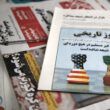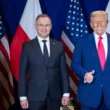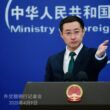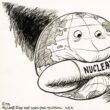China unwisely defers on disarmament
By Gregory Kulacki |
China’s growing economic and military capabilities may have increased expectations in the United States. But the Chinese Communist Party takes a more modest view of its ability to address geopolitical challenges, including the challenge of nuclear disarmament.
Limits to growth. The Chinese government is responsible for the welfare of nearly a fifth of humanity. According to the World Bank, China ranks 71st among all nations in gross domestic product per capita. Chinese leaders see the enormous size of their population as a significant constraint on the nation's economic capabilities. They wish their counterparts in the United States were more understanding.
Demographic constraints on China’s long-term economic prospects led the Chinese Communist Party to fix military expenditures at approximately 2 percent of GDP: a percentage it has maintained since 1988. Comparatively high rates of annual economic growth have allowed corresponding annual increases in military spending, but as the Chinese economy matures and its growth rate slows, military expenditures are likely to follow suit.
An obligation, not a luxury. China's leaders are aware that their participation in international nuclear arms control negotiations is not predicated on attaining a certain level of economic or military development. They understand that it is required under the terms of the Nuclear Non-Proliferation Treaty (NPT). The most important obligation China incurred by acceding to the NPT in 1992—an obligation it shares with the other four nations (the United States, Russia, the United Kingdom, and France) temporarily allowed to retain nuclear weapons—is to "pursue negotiations in good faith" on "a treaty on general and complete disarmament."
By any measure, China is not living up to that commitment. None of the nuclear weapon states are. The successful negotiation of the Comprehensive Nuclear Test Ban Treaty—opened for signature in 1996—is the last substantial step toward disarmament undertaken by the nuclear weapon states. China still refuses to ratify the treaty. Chinese arms control experts say their government is waiting for the United States to ratify it first—the United States has signed it, but the Senate hasn't confirmed it—which suggests China's leaders have little interest in playing a more active role in addressing the challenge of nuclear disarmament.
That's unfortunate. China maintains a comparatively small nuclear arsenal that it keeps off alert. The leadership remains committed to the no-first-use policy China announced after its first nuclear test. These policies entitle China to claim a leadership role in international nuclear arms control.
Lead or lose. Chinese leaders may not be aware that their passive approach to nuclear disarmament is a growing diplomatic liability. Defense analysts and policy makers in Washington, Tokyo, and other national capitals suspect China is unwilling to play a more active role in multilateral nuclear disarmament talks because it is preparing to build up its nuclear arsenal, place its nuclear forces on high alert, or alter the nation's no-first-use policy. The Chinese government steadfastly refuses to discuss the size, composition, or operations of its nuclear forces, encouraging these suspicions. Chinese nuclear arms control analysts claim that Chinese silence is a constructive policy because the uncertainty that it creates allows Beijing to deter a nuclear attack without increasing the size or raising the alert level of its nuclear forces. That may be true. But whatever benefit China derives from encouraging doubt about its nuclear capabilities comes at the cost of growing international concern about Beijing's intentions.
Though China's obligation to participate in good-faith disarmament efforts isn't linked to its level of development, there is a connection between China’s increased economic and military capabilities and the growing international concern about the ambitions of China’s leaders. Long-simmering territorial disputes between China and its neighbors are heating up as Beijing applies greater economic leverage and military muscle when pressing sovereign claims. The non-nuclear weapon states on the receiving end of that pressure feel intimidated by China's nuclear capabilities.
More importantly, the anxieties of China's non-nuclear neighbors are a significant factor in Washington's deliberations about its own nuclear forces. US defense officials oppose proposals to declare a no-first-use policy, or de-alert or reduce US nuclear forces, in part because of concerns that these changes would undermine the credibility of Washington's assurances to its Asian allies. China's lack of transparency about the size, composition, and operations of its nuclear forces—however well-intended—makes it more difficult for US proponents of nuclear arms control to overcome official opposition.
Times have changed. Mao Zedong, Zhou Enlai, and the other founders of the People's Republic decided to develop nuclear weapons at a time when they believed the world was in the throes of a revolutionary struggle that could ignite a global war. The Chinese Communist Party no longer views the international situation that way. The report of the 18th Party Congress in 2012 describes an increasingly multipolar, interdependent, and stable world in which China may no longer need nuclear weapons.
In such a world, China's nuclear weapons are in some ways a liability. While the leadership in Beijing says it seeks a more equitable distribution of national authority and influence in this new multipolar world, many US analysts and officials interpret Chinese efforts to achieve that balance as a malicious attempt to displace the United States as a global leader. They argue that China's defense of sovereign claims presages aggressive national ambitions. And they warn that China sees the possession of nuclear weapons as a sine qua non of global leadership.
A recommendation. If China really sees the world in the terms described by the Party Congress, Beijing could take several steps to consolidate the emergence of such a world. One step would be to play a more active role in international nuclear arms control negotiations. Another, more dramatic step would be a unilateral decision to disarm.
The willingness to disarm would undercut the arguments of skeptics who see China as an aggressor seeking regional or global hegemony. It would give China an enormous boost in international prestige, rebalance international relations, and recast international perceptions of China's sovereign claims. A non-nuclear China could more effectively press other nuclear weapon states to follow its example. And a China without nuclear weapons would finally receive from Washington the no-first-use assurance it has sought in bilateral talks on strategic stability.
China arguably has more to gain from getting rid of its nuclear weapons than it does from keeping them, modernizing them, or putting them on alert. As China's leaders seek to rebalance international relations in what they describe as a new and cooperative era of multipolar interdependence, eliminating China's nuclear weapons is a strategic option that deserves serious consideration.
















